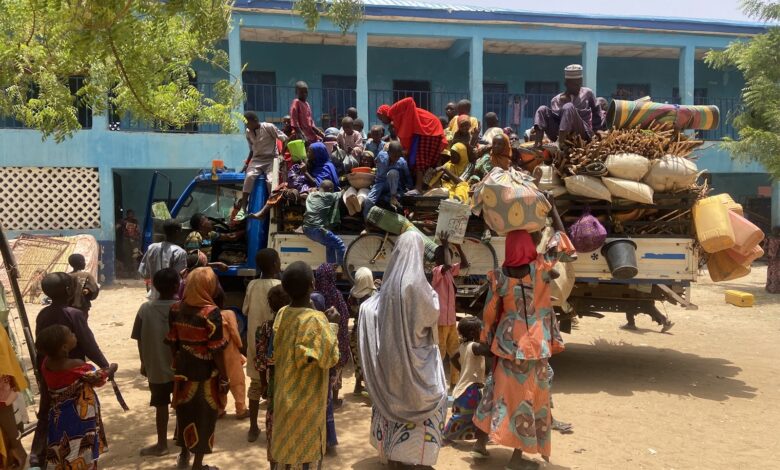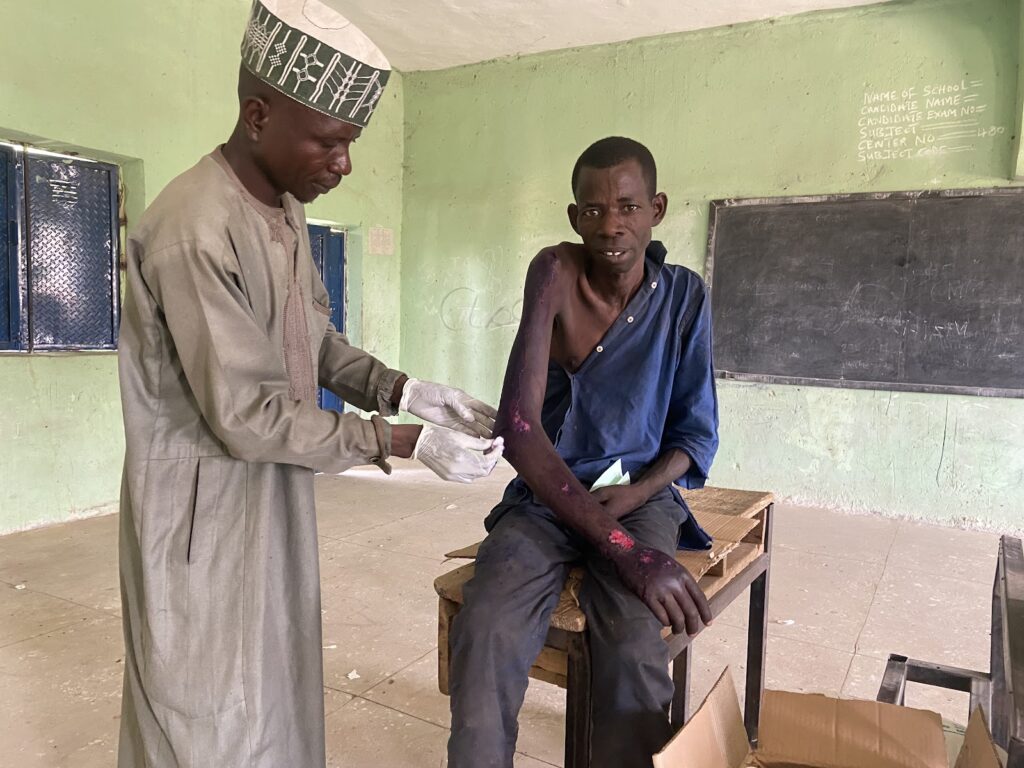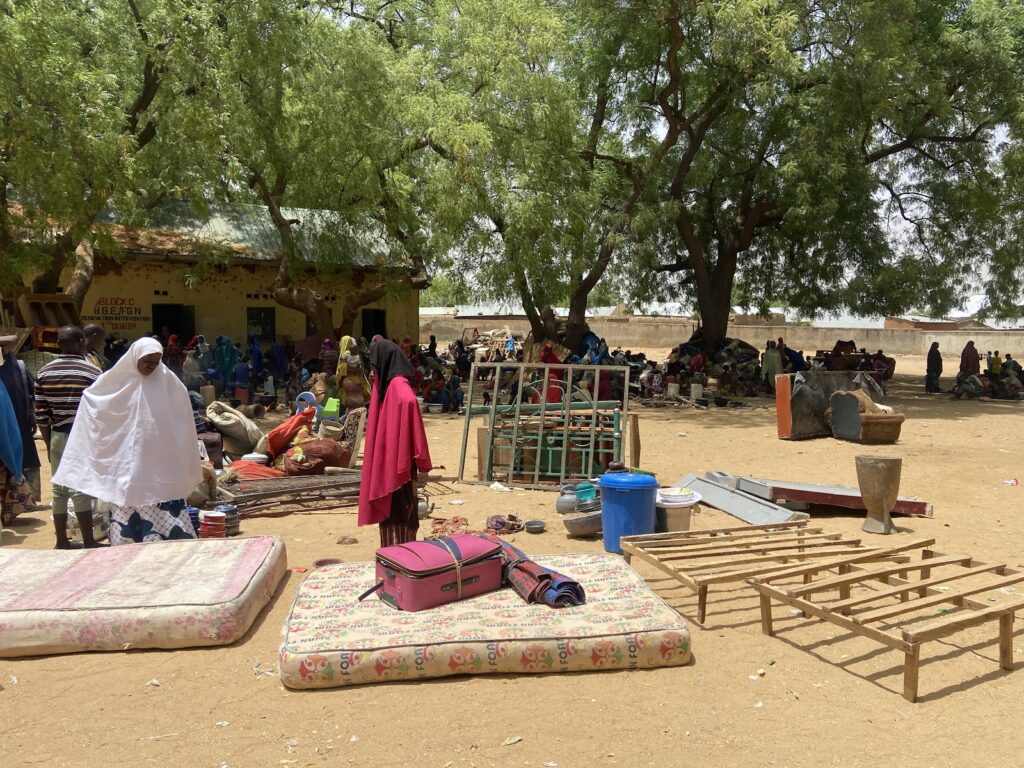No Simple Way Home: Displaced Sokoto Residents Driven To Despair And Frustration
More than 5,283 displaced locals are currently at a crossroads after terrorists set their villages on fire in northwestern Nigeria.

Tucked behind a Dogonyaro tree at the centre of the Mai Tandu Model Primary School in Isa, now serving as a temporary shelter for internally displaced persons, Ibrahim Shehu huddled among other men, nearly invisible until he let out a bout of cough from where he sat. Ibrahim looked pale and unwell. His words were slow and hollow, yet they carried a familiar stream of grief.
He stood up and led us to the veranda of one of the dilapidated classrooms. It was a little rowdy and more displaced people were still trooping into the makeshift camp. By the time we sat down, swells of saliva had already dried up in his mouth, just like they had when terrorists set him on fire about four days earlier.
Around 9 p.m. on a Monday late last month, Ibrahim was with his friend at the favourite suya (barbecue) spot in Gidan Sale. He had a stick of cigarette between the fore and middle fingers of his left hand and kola in his right as wisps of smoke poured into the air. His friends were also in on it as they discussed the unbridled killings in the area. Spending nighttime with them had been an escape from his strenuous daily routine. He worked as a logger and barely had time for such gatherings during the day.
Ibrahim was about to light another stick when he saw residents spinning on their heels and shouting, “Barayi (thieves)! Barayi (thieves)!” as they fled for their lives. His eyes widened in terror. A bunch of heavily armed terrorists on motorbikes had surrounded the village. Immediately, he ran towards his house – a few metres away – to pick a thing or two before joining others to escape into the bush. But it was too late. Some of the terrorists, about three of them, had followed in his direction.
He knew he had to do something. So, he hid under the bed and covered himself with a chair. The terrorists rummaged through the sitting room before stomping into the bedroom for him. They knew he couldn’t have slipped out so quickly. But when they could not find Ibrahim, they poured fuel on the chair and set the room on fire.
He tried to scream for help but swallowed his words, even as the fire crawled towards him. The terrorists were still in the room. Eventually, they left when the fire got thicker and closer to them.
“Immediately I realised they had left the room, I came out from my hiding place with severe burns and started running,” Ibrahim recalled.

The terrorists besieged Gidan Sale and other villages along the axis in the Isa area of Sokoto, North West Nigeria, in what seemed like a premeditated attack to punish the communities for informing on them, says Haliru Ahmad, the village head of Gidan Sale.
The other affected villages were Girnashe, Kuka Tara, Tozai, and Tubali.
“Recently, local vigilantes and security agents have been carrying out offensives on the terrorists’ hideouts. So, they claimed we were the one feeding them with information about their activities and whereabouts,” Haliru told HumAngle.
The terrorists were out for more than just loot. Many a time, they sack villages to abduct locals or rustle livestock. That night, however, more than half of the settlements were set ablaze, including food storage. According to the IOM displacement reports, the attacks displaced about 5,483 people, including children, from about eight villages in the area. Many of them currently occupy public facilities like schools and abandoned buildings.
Ibrahim Idi, 24, wasn’t so lucky. He couldn’t make it out of the village alive. He had returned home to celebrate Sallah with his family and would wait a few more days for his graduation from Islamiyyah. Ideally, he would celebrate with his friends during the day and later in the evening, he would visit close relatives before returning to his base in the South at the end of the week.
But that Monday, after the event, as Ibrahim was returning the praying mats they had used during the graduation, he encountered the husky-haired terrorists. He tried to run but was too close to escape the range of their firearms. He was shot in the head, chest, and stomach multiple times.
“I was at the borehole fetching water when he passed, not knowing that was the last time I was going to see my son. I can’t imagine how life will be without him because he was the one taking care of me and his siblings from the little he made in the South,” Kuluwa, his mother, said.

Terrorists, locally known as bandits, have subjected locals in the country’s North West to a reign of terror for close to a decade now as authorities struggle to contain the growing violence. They have continued to sack villages, sexually assault women, impose levies on communities, kill locals, and control a million-dollar kidnap-for-ransom enterprise to keep their operations running.
Authorities have carried out air raids, launched offensives into their hideouts in the forest, shut down telecommunication services in the past and even designated them as terrorists, allowing for stiffer sanctions under the Terrorism Prevention Act. But it appears to be a drop in the ocean. Thousands of the terrorists still occupy large swathes of the region’s ungoverned spaces from which they launch their attacks, stockpile weapons, and hold their abductees.
The axis of tragedy
Banditry is often regarded as a primarily rural problem. Rural North West Nigeria and parts of the north-central region continue to suffer the most. Security responses in these places are often slow or totally absent. The terrorists are now filling this gap and have developed a degree of sociopolitical influence and sophistication in rural villages, so much that they position themselves more like direct challengers of the state’s authority.
It does not help that the country’s military is stretched thin. The soldiers are deployed to fight jihadists in the North East, separatist agitations in the South East, and farmer-herder crises in central Nigeria. They are also at the front row of quelling bunkering in the oil-rich Niger Delta.
“There is no way we can go back to our villages. It is not safe,” Haliru said matter-of-factly. “There was a time we had a mobile station there. They came from Sokoto. That time, gaskiya, we were living peacefully without the fear of attacks or anything. But since they were transferred about four years ago, we’ve been at the receiving end of the killings and abductions from the terrorists.”
Authorities in the region floated security outfits to complement the military operations. Members were also posted to some of the rural communities. But Haliru said they are only able to scratch the surface of the situation.
HumAngle observed that the 90-kilometre stretch of Marnona-Isa Road, along which these villages are located, has no security checkpoints for an area plagued by constant attacks and abductions.
“In addition to factors like expansive, inaccessible terrain, rural areas also experience a weaker governmental and law enforcement presence, allowing criminal activities to flourish with relative impunity — which begs the question, where and who are their representatives and how much is being done to bring governance to these spaces?” says Jesse Attah, Risk Operations and Intelligence Coordinator at Beacon Consulting, an Abuja-based security and risk management firm.

Stuck in limbo
Every single morning, the model primary school wakes up to new arrivals from villages outside the main township. With more than 5,283 displaced locals in camp already, putting a strain on the little humanitarian support that trickles in, many are unclear what the next day holds for them.
Hafsat Sama’ila, 20, leaned against the wall of one of the classrooms, slowly pulling the tesbih (prayer beads) that dangled in her right hand as if it would melt away the rage pounding so hard in her chest.
It was one moment she knew all too well. But it never occurred to her that it would come so soon and even more so leave a big hole in her life. During the attack on Gidan Sale, her house was razed to the ground, and her aunt, Amina, was taken away into the bush. Her younger brother also fell to the bullet that pierced through his neck.
The next morning, when the women came back to the village from the bush where they had hidden, the lifeless body of her husband was found stuck in the window, probably shot when he was trying to escape.
Memories of their time together are still very clear to her, like a splinter. The way he called onto her and playfully lingered on her name. The way he sometimes helped to lull their months-old baby to sleep before he went to bed. The way his meekness made her heart flutter.
“I’m confused and do not know what to do right now. I lost everything to the attack,” her response was slow and measured. “Some people are going back to take their foodstuffs, but my father can’t go back to our village because we have nowhere to return to as the houses were all burnt to ashes.”
Like Hafsat, many of the displaced locals cannot return to their homes. It’s no longer what it used to be. Unfortunately, the camp, too, has no provisions to hold them for so long.
“We have to bear with whatever conditions we find ourselves in. It’s not convenient, but we have to,” Haliru reflected. Even back home, we have spent four to five years without cultivating our land. The little we eat is within the village. We can’t go outside the village. So, we’ve got to bear with whatever life throws at us now.”
Support Our Journalism
There are millions of ordinary people affected by conflict in Africa whose stories are missing in the mainstream media. HumAngle is determined to tell those challenging and under-reported stories, hoping that the people impacted by these conflicts will find the safety and security they deserve.
To ensure that we continue to provide public service coverage, we have a small favour to ask you. We want you to be part of our journalistic endeavour by contributing a token to us.
Your donation will further promote a robust, free, and independent media.
Donate HereStay Closer To The Stories That Matter




